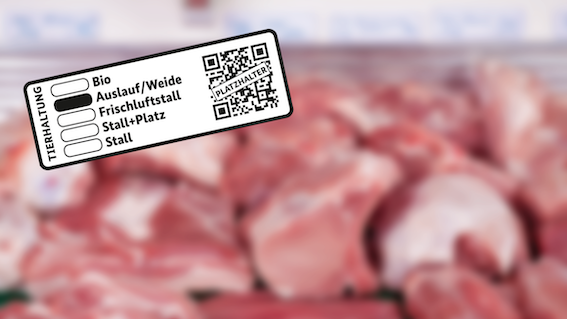Animal husbandry labeling decided

Last Friday, the German Bundestag passed the law presented by the Federal Minister of Food and Agriculture, Cem Özdemir, for state, mandatory animal husbandry labelling. Changes in the building code were also decided to facilitate barn conversions. The labeling of husbandry covers five types of husbandry: "Barn", "Barn+place", "Fresh-air stable", "Outrun/Pasture" and "Organic". The law initially regulates the fattening of pigs and is to be quickly extended to other animal species, other areas in the value chain, for example in gastronomy and the life cycle of the animals.
In addition, the resolution of the law on barn conversions will make it easier for animal husbandry companies to adapt their barns to more animal-friendly forms of husbandry in the future. The law provides privileges under building law for companies that want to convert their stables in order to convert their existing animal husbandry to the "fresh-air stable", "outdoor/pasture" or "organic" forms of husbandry. Pet owners do not have to reduce their stocks. It is also possible that a new replacement building can be built at a different location than the old building. This means that animal husbandry remains possible even during the construction work for a replacement stable.
Both laws are now expected to be discussed in the Bundesrat on July 7, but do not require approval there.
Federal Minister Cem Özdemir explains: "Today is a good day for the livestock farms in our country and for consumers. With the mandatory animal husbandry labeling and the simplification of barn conversions, we are tackling two very central building blocks today, which are essential for a future-proof animal husbandry are necessary. This means that the restructuring of animal husbandry has finally been initiated after years of crisis and many attempts at labeling. This is a great and joint success of the coalition for our agriculture. Keeping fewer animals better and good economic prospects for our farmers, that's what we're about.
Good meat should continue to come from Germany in the future. With the mandatory animal husbandry labeling, consumers will be able to see on the shelf or at the meat counter how the animal was kept. We are now starting with pork, will gradually add other animal species and also other sales channels, so that you as a consumer can then also see in the restaurant how your schnitzel was kept. This also strengthens animal welfare. With changes in building law, we are making it easier for livestock farms to convert their farms to be animal-friendly.
My thanks go to the traffic light groups and everyone who supports the conversion of animal husbandry. Preparatory work is behind what has been achieved today, including the work of the Borchert Commission and the Future Commission for Agriculture.
I've always said: For me, the animal husbandry label also includes an indication of origin. Consumers should know how an animal was kept and they want to know where it was kept. In this way, they can make an informed purchasing decision and actively support regional value creation and high environmental and animal welfare standards."
